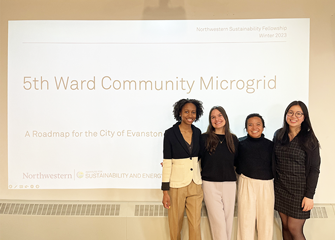Building Sustainable Strategies for Food
Ankur Seth is among the four Master of Science in Energy and Sustainability (MSES) students who received a Northwestern Sustainability Fellowship for the winter 2022 quarter

Northwestern Sustainability Fellows are working in partnership with the City of Evanston to outline the economic, technical, and policy details involved with microgrid installation. A small-scale network of local users, microgrids can operate independently or in tandem with the larger power grid. The project began during the winter quarter and will continue into the summer when a new team of fellows join.
The Northwestern Sustainability Fellowship is a project-based program offered twice annually with funding from Ameresco, a leading cleantech integrator and renewable energy asset developer, owner, and operator. Projects are jointly overseen by the Paula M. Trienens Institute for Sustainability and Energy and sustainNU and student fellows receive tuition grant. Since the partnership began in 2021, around sixteen student fellows have gained real-world experience in energy and sustainability and grown as leaders while furthering the University’s mission to support hands-on experiential learning.
“As a Northwestern alum and Evanston resident, it gives me immense pride and joy to see this fellowship program blossom into something that can really benefit and uplift the students, the University, and the Evanston community as a whole,” said Louis Maltezos, executive vice president, Ameresco. “These student fellows represent the future of cleantech and all of its unbridled potential, and I’m confident that those who have taken part in the fellowship, from 2021 and beyond, will continue to help usher in the energy transition solutions to leave a lasting impact in communities all over the world.”
During winter quarter, four fellows set out to learn about the details involved with placing a community microgrid in Evanston’s 5th ward, co-located with the Fleetwood Jourdain community center. The 5th ward is a low-and-moderate-income and environmental justice community —it faces greater environmental burdens and reduced quality of life compared to areas nearby. A microgrid could, thus, promote resilience in an area more prone to electricity outages and climate vulnerability.
With the goal of contributing to equity and community resilience goals outlined in Evanston’s Climate Action Resilience Plan, the students developed a project proposal that could be funded by multiple sources, including part of the $25M set aside by the State of Illinois for energy and sustainability initiatives as a potential funding source. Energized by the initial partnership, the microgrid project will continue with a new cohort of students this coming summer.
Throughout the 10-week fellowship, the team engaged over twenty stakeholders including city staff, councilmembers, energy equipment distributors, and local school district members. “Engaging with different stakeholders was useful to more thoroughly understand the community and the dynamics of the City of Evanston. Their experiences and expertise informed the design aspects of the microgrid and helped us ensure the proposed system meets the resiliency needs of the community,” reflected Beatriz Sampaio, ‘23 graduate of the Master of Science in Energy and Sustainability (MSES) program.
One of four fellows, Sampaio and her team harnessed their own unique backgrounds throughout the project. The team included Michelle Chung (MSES ’23), Jessica De La Paz (Civil Engineering PhD student), and Taylor Nchako (Northwestern Pritzker Law ’23).
The 2023 summer Sustainability Fellowship cohort will build upon the groundwork laid by the initial microgrid project by partnering with school district (D65)’s ongoing effort to design a school campus in the 5th Ward. The next iteration of the project will also incorporate more of the city’s community development plans into the microgrid. “We knew we had the support of our client in putting together our microgrid feasibility study, but we didn’t know how other stakeholders in the Evanston community would react. It was a great surprise when other stakeholders including SD65, ComEd, and the Evanston Township High School were curious to learn more about our project and how they could get involved with it. I hope the next team can leverage that excitement,” Sampaio shared.
“The City of Evanston had a wonderful experience collaborating with four brilliant fellows who helped the City start to imagine what a microgrid might look like in one of our neighborhoods,” shared Cara Pratt, sustainability and resilience manager at the City of Evanston. Pratt worked closely with the first fellowship cohort and will play a key role as the new iteration of the project unfolds this summer. “We look forward to continuing to collaborate with future fellows to implement our City's Climate Action & Resilience Plan.”
As the torch is passed from one fellowship team to the next, the first team offered guidance and reflections from their experience. First, Sampaio suggests that the team “get to know the community more: it is crucial to get direct community feedback on the microgrid and to provide educational opportunities to share what a microgrid is and what it can provide.” For example, batteries could provide emergency refrigeration of medication in the case of grid outages. In the long run, the team envisions that as more funding is secured, more Evanston buildings can be integrated into the microgrid in a modular way.
On a more personal level, Sampaio says: “The Northwestern Sustainability Fellowship certainly was the most rewarding experience I had throughout graduate school,” Sampaio said. “It helped me gain real-world experience in concepts learned in the classroom and contribute to the City of Evanston’s more sustainable and resilient future.”